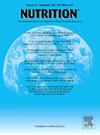马德里(西班牙)地区跨性别人群的饮食习惯及其对营养需求的适应
IF 3.2
3区 医学
Q2 NUTRITION & DIETETICS
引用次数: 0
摘要
目的分析变性人群在变性过程中的饮食习惯,评估变性人群在变性过程中的营养需求,并反思变性人群可能面临的饮食挑战。方法采用横断面观察研究方法,选取年龄在18 ~ 60岁之间的146例(其中58.90%为变性女性[n = 86], 41.09%为变性男性[n = 60])。通过食物消费频率问卷、24小时饮食回忆和随后使用DIAL软件输入数据来评估饮食习惯和营养摄入。人体测量参数体重和身高按照国际人体运动测量促进协会提出的方案确定,腰围按照世界卫生组织的方案确定。结果研究发现,研究人群饮食不健康,水果消费量低(变性男性为6.4±4.39口粮,变性女性为11.5±2.59口粮,P = 0.758898323)。饮食中脂肪(跨性别女性和跨性别男性分别为43.62和44.24)和蛋白质(跨性别女性和跨性别男性分别为16.63和15.65)较高。碳水化合物、叶酸、维生素D和钙、碘、锌等矿物质的缺乏,以及硒、尤其是磷的过量,这些都可能影响激素水平。这些变化是由于他们希望在外表上看起来与所期望的性别相似,他们遵循规则、行为方式和初级社会化的习惯(在他们的生活中从家庭中学到的)。对我们研究中观察到的变化的分析表明,在过渡过程中,饮食习惯的改变是基于从互联网上获得的信息,这些信息往往是不正确的。因此,建议实施增加水果、蔬菜和全谷物消费的策略是明智的。在这项研究中,我们发现一些营养缺乏取决于激素治疗的类型,因此营养护理必须个体化。因此,应该进行个性化的营养干预,重点是增加水果、蔬菜和全谷物的消费。建议在科学证据的基础上为跨性别者制定营养建议、诊断和干预指南,并向负责随访的临床医生提供营养建议。本文章由计算机程序翻译,如有差异,请以英文原文为准。
Eating habits of a cross-section of the transgender population in the area of Madrid (Spain) and their adaptation to their nutritional needs
Objectives
To analyze the eating habits of the transgender population throughout the transition process, evaluate the nutritional requirements associated with gender transition, and reflect on the possible dietary challenges facing the transgender population.
Methods
A cross-sectional observational study was carried out with 146 individuals (58.90% transgender women [n = 86] and 41.09% transgender men [n = 60]) aged between 18 and 60 y old. Eating habits and nutritional intake were evaluated through a food consumption frequency questionnaire, 24-h dietary recall, and subsequent data entry using DIAL software. The anthropometric parameters weight and height were determined following the protocol proposed by the International Society for the Advancement of Kinathropometry and waist circumference was determined following the protocol of the World Health Organization.
Results
The study found that the diets of the studied population were unhealthy, with low fruit consumption (6.4 ± 4.39 rations in transgender men versus 11.5 ± 2.59 rations in transgender women, P = 0.758898323). Diets were high in lipids (43.62 and 44.24 in transgender women and transgender men, respectively) and protein (16.63 and 15.65 in transgender women and transgender men, respectively). Deficiencies in carbohydrates, folate, vitamin D, and minerals such as calcium, iodine, and zinc were detected along with an excess of selenium and especially phosphorus, which could affect hormone levels.
Conclusions
Changes were detected as a result of their desire to look similar physically to the desired sex, they followed rules, ways of acting, and habits of primary socialization (learned in the family during their life). The analysis of the changes observed in our study revealed that during the transition process, eating habits changed based on information, often incorrect, obtained from the internet. Therefore, it is advisable to recommend implementing strategies that increase the consumption of fruits, vegetables and whole grains. In this study, we detected some nutritional deficiencies depending on the type of hormone treatment, so nutritional care must be individualized. Therefore, individualized nutritional interventions focused on increasing the consumption of fruits, vegetables, and whole grains should be carried out. It would be advisable to develop guidelines for nutritional advice, diagnosis, and intervention for transgender people based on scientific evidence as well as provide nutritional advice to the clinicians responsible for their follow-up.
求助全文
通过发布文献求助,成功后即可免费获取论文全文。
去求助
来源期刊

Nutrition
医学-营养学
CiteScore
7.80
自引率
2.30%
发文量
300
审稿时长
60 days
期刊介绍:
Nutrition has an open access mirror journal Nutrition: X, sharing the same aims and scope, editorial team, submission system and rigorous peer review.
Founded by Michael M. Meguid in the early 1980''s, Nutrition presents advances in nutrition research and science, informs its readers on new and advancing technologies and data in clinical nutrition practice, encourages the application of outcomes research and meta-analyses to problems in patient-related nutrition; and seeks to help clarify and set the research, policy and practice agenda for nutrition science to enhance human well-being in the years ahead.
 求助内容:
求助内容: 应助结果提醒方式:
应助结果提醒方式:


